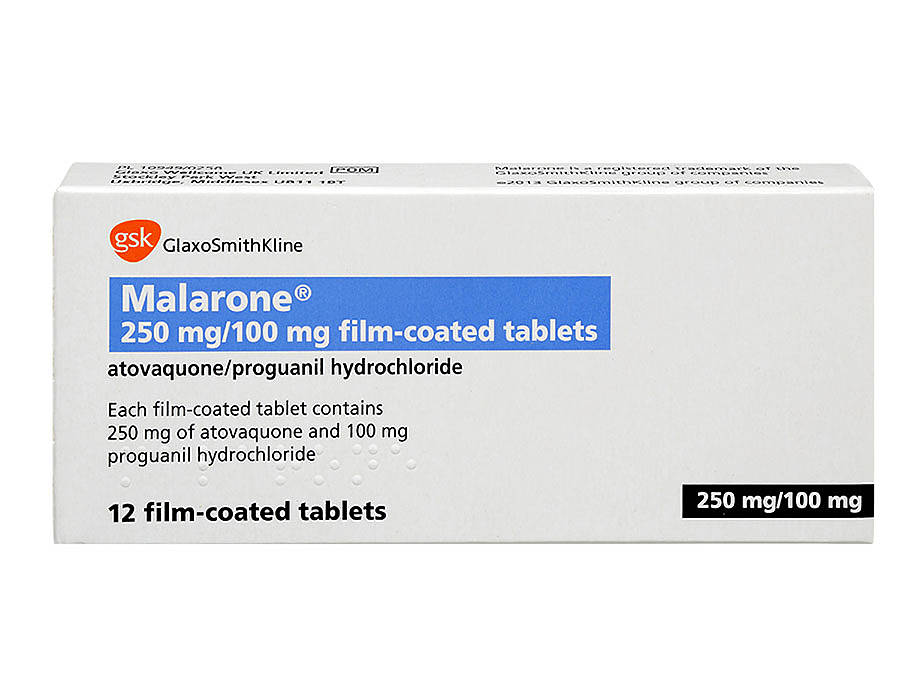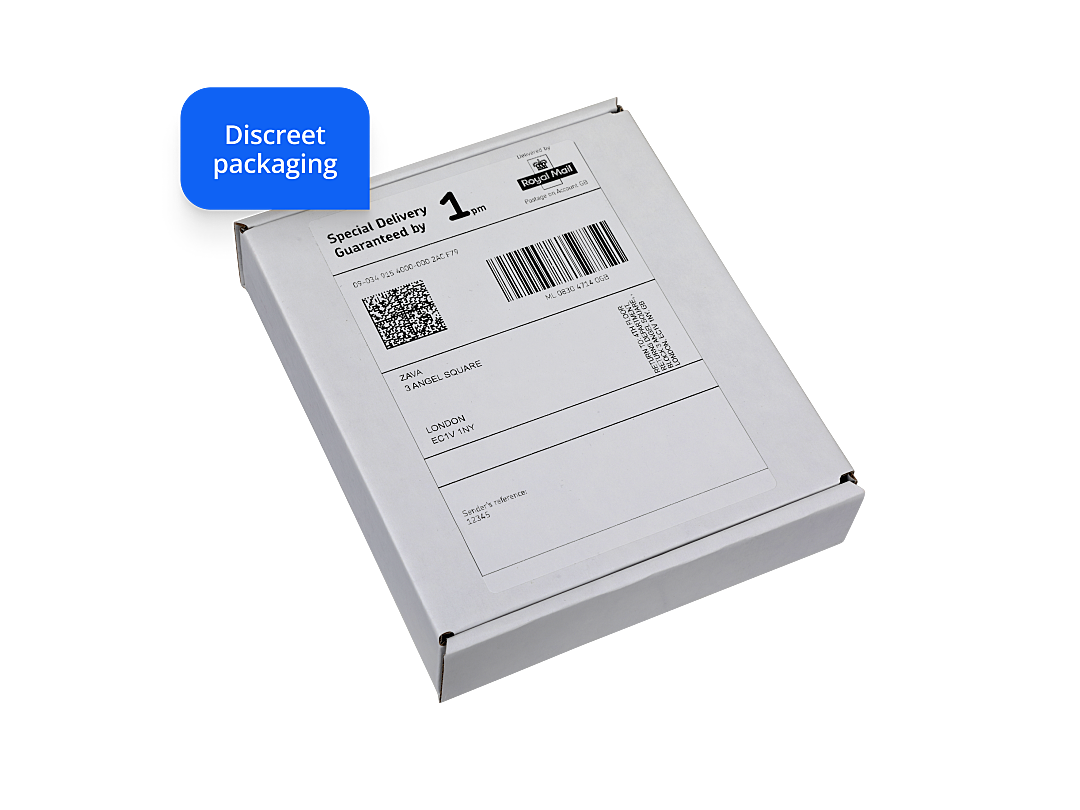



Prices from £35.00
In stock. Simply fill in a brief consultation questionnaire and one of our doctors will review your request today.
-
Malarone tablets are a great choice for last minute travellers as you can start treatment just 1 to 2 days before your trip. Malarone tablets are less likely to cause side effects compared to other treatments, like doxycycline.
Please note, when you request a generic (non branded) treatment, the product you receive may look slightly different than what we show on our website. The active ingredient in the medication will be exactly the same though. This is because we use a range of manufacturers to ensure we always have enough stock for patients. If you have any questions, you can message our Patient Care team or doctors through your account.
Prices
10 tablet(s) / 250 mg - £35.00
250 mg - £50.00
250 mg - £70.00
250 mg - £88.00
250 mg - £104.00



About Malarone
How do I take Malarone?
You should take one tablet daily. Your course should start 2 days before you travel to an infected area. The treatment should continue for the duration of your stay in an infected area, and then for a further 7 days. If you miss a dose, don’t panic. Take it as soon as you remember or, if it is near your next dose, skip the forgotten dose and continue treatment as normal. If you vomit or have diarrhoea within an hour of taking Malarone, take a repeat dose. In the case of an overdose, seek medical assistance.
Paediatric Malarone tablets are available for children – your doctor will need an accurate weight to make sure your child gets the right dose. The same instructions apply, just with this different, lower dose tablet. You should take your tablet with food and liquids.
Active ingredient of Malarone
Each Malarone tablet contains atovaquone 250mg and proguanil hydrochloride 100mg. Malarone tablets also contain Poloxamer 188 BP., microcrystalline cellulose Ph.Eur., low-substituted hydroxypropyl cellulose USNF., povidone K30 Ph.Eur., sodium starch glycollate BP., magnesium stearate Ph.Eur., methylhydroxypropyl cellulose Ph.Eur., titanium dioxide Ph.Eur., iron oxide red E172, macrogol 400 Ph.Eur. and polyethylene glycol 8000 USNF.
The side effects of malarone include
- Feeling sick
- Stomach pain
- Diarrhoea
- Loss of appetite
- Headache
- Difficulty sleeping
- Abnormal or strange dreams
- Coughing
- Fever
- Hair loss
- Tiredness and weakness
- Depression
- Anaemia (low red blood cell count)
- Disturbance of salt balance in the body
- Temporary increase in some enzymes produced by the liver and pancreas
For a full list of side effects, always check the patient information leaflet that comes with your medication.
In the case of an allergic reaction (rash, shortness of breath, itchy skin, swollen face, eyelids and mouth), seek immediate medical assistance.
If you experience any of these side effects, or any others, speak to your doctor if you are concerned.
If you suffer any flu-like symptoms for up to a year after your return, you should see your doctor right away and let them know you’ve been to a malaria risk area.
-
-
Malarone consists of Atovaquone and Proguanil. Both are active ingredients, which prevent the malarial parasite developing in the liver. Proguanil targets the reproductive process by blocking an enzyme the parasite needs to multiply. Atovaquone also works by interfering with a particular stage in the parasite’s reproductive cycle, stopping the infection from taking hold. With this combination of ingredients, Malarone tablets provide an effective protection from the malarial plasmodium parasite.
-
-
Malarone tends to be highly effective against Plasmodium falciparum (the most serious type of Plasmodium), but much less effective in the prevention of the less serious types. Depending on which malarial area you are travelling to, your doctor will advise you on the suitability of Malarone tablets and other antimalarials.
-
-
Malarone is normally chosen when travelling to a country with a particularly virulent variant of the illness. It is not suitable for everyone, for example those with severe kidney problems. Pregnant and breastfeeding women may also be recommended an alternative treatment. As with most kinds of medicines, you need to make sure you inform your doctor of your medical history and all medications you’re taking, to ensure you are prescribed the most suitable antimalarial possible.
-
-
Malarone has no known interactions with any food and drink, allowing you to stick to your preferred diet. If you are taking a contraceptive pill, you will find it useful that Malarone does not decrease its contraceptive protection, meaning you continue your contraception as usual. That being said, it is very important that you follow your doctor's advice carefully, taking your daily malarone tablet regularly and for as long as necessary.
As with all medications, Malarone does have some side effects which you should be aware of before taking it. This are listed near the top of this page.
-
-
Yes. Sometimes patients believe they can stop treatment immediately upon arriving home, provided they are well. This is not the case - you must continue taking your Malarone tablets for at least a week after leaving the malarial area you travelled to. Not doing so can lead to an outbreak of the illness, if you have been exposed to the parasite during your time abroad.
-
-
Malarone is taken daily, which some patients prefer to weekly tablets. While Lariam and Doxycycline need to be taken for up to a month after returning from a malaria risk area, treatment with Malarone only needs to be continued for a week. Malarone is also generally considered to be better than Lariam and Doxycycline in terms of side effects.
-
-
Malarone tablets are round, bi-convex and pink.
-
-
- are pregnant
- are breastfeeding
- are under 40kg (take the paediatric form of Malarone)
- are allergic to any of the ingredients in Malarone
- have severe liver and kidney problems
- are taking medications which interact, which include metoclopramide, tetracycline, rifampicin or rifabutin (these may affect your ability to absorb Malarone). Always check with your doctor or pharmacist about the medications you’re taking
- are taking indinavir
Malarone should not affect your ability to drive or operate machinery. However, if you feel at all drowsy, avoid these activities.

Dr Charlotte Hammerton studied medicine at the University of Nottingham and since graduating has worked in hospitals in London, Kent, and Sussex.
Meet our doctorsLast reviewed: 24 Mar 2019
-
Malarone 250 mg/100 mg film-coated tablets, Patient Information Leaflet, EMC [accessed February 2023]
-
Malarone, Drugs.com [accessed February 2023]
-
Malaria, fitfortravel [accessed February 2023]
-
Malaria, National Health Service [accessed February 2023]
Once you know you’re travelling to country with a risk of malaria, you can get treatment before you go. ZAVA offers a range of options to consider, without needing to see a doctor face to face.








